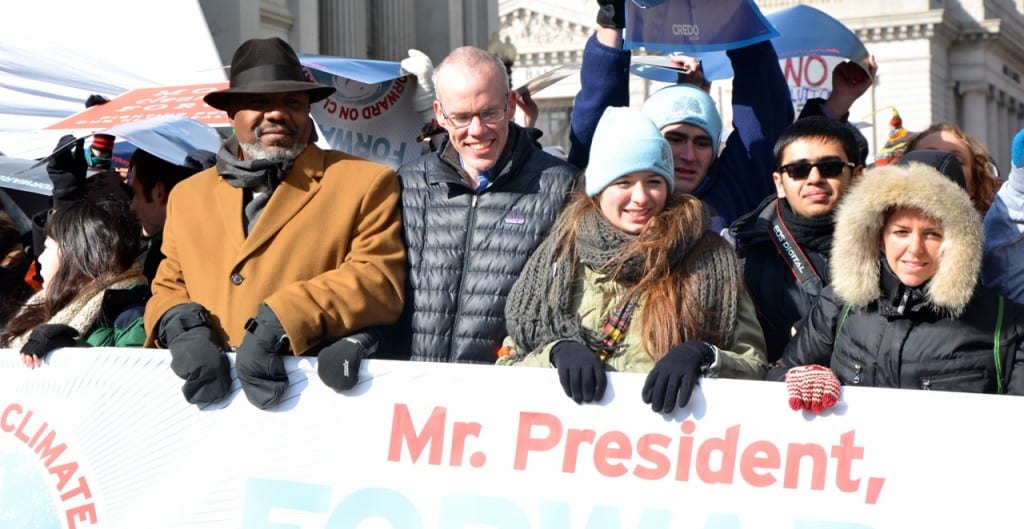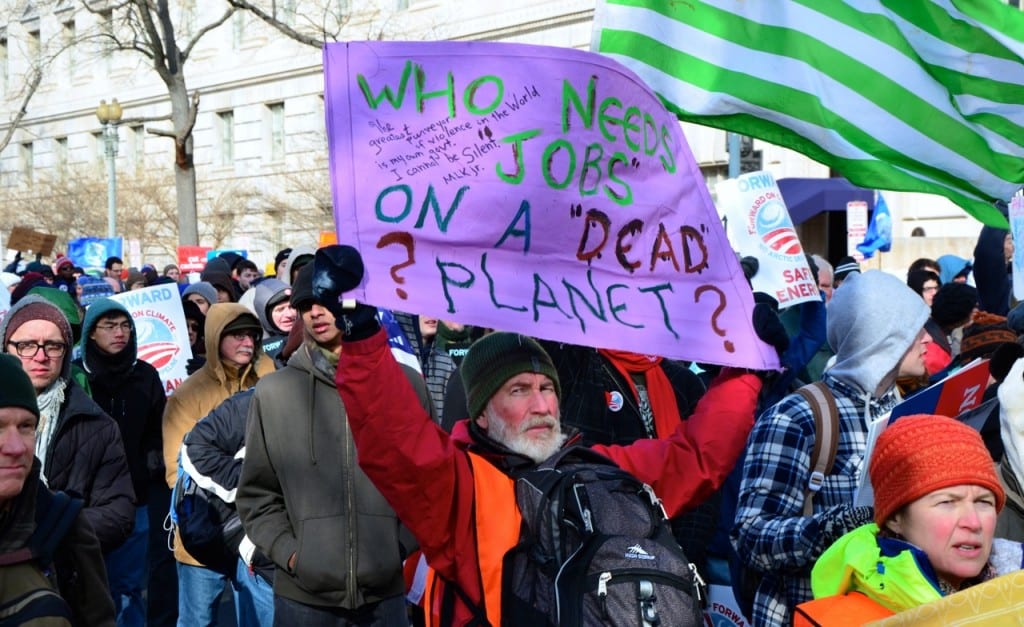Who Needs Jobs on a Dead Planet? –
The Big Picture
–
by Glynn Wilson –
WASHINGTON, D.C. – Following folks from all over the country willing to travel thousands of miles and brave freezing temperatures and a bone chilling wind to march from the Washington Monument around the White House and back to bring national attention to the climate change issue, it was hard to visualize global warming. A tiny number of scientists seem more worried about global cooling, and the conditions of the march were certainly more indicative of another ice age than a catastrophic over heating of planet Earth.
But that has been one of the problems for years in getting the public and politicians to acknowledge that the scientific evidence shows an unmistakable trend of rising surface temperatures across the globe, along with melting arctic ice and rising seas. There is no mistaking the cause, the burning of fossil fuels for energy to run the machines of the industrial age.
Yet genetically, people are hard wired to care more about and worry about acute illnesses than chronic ones, and climate change falls into the long-term, chronic sickness category. The effects happen in cycles over long periods of time. That’s not the same as a loved one who contracts cancer or heart disease and dies suddenly. An acute illness is an immediate threat, even if it is caused by exposure to chemicals over a lifetime.
Back during the 1990s, during the personal computing boom and the rise of the Internet as a communications tool, I spent many hours, days, weeks and months reading everything published on the subject of global warming and climate change, even studying media coverage of the issue for a doctoral dissertation.
At the end of the decade and the beginning of the new millennium, one of my favorite reporters who covered the issue was a guy named William K. Stevens, who wrote about it for the New York Times. He retired from the paper in 2000 and then published a book on climate change: The Change in the Weather: People, Weather, and the Science of Climate.
I honestly thought this would end the debate and that we as a country would finally face up to the problems and begin to work on alternative energy sources with greater vigor. But a couple of things happened to derail that effort. Vice President Al Gore did not use his own strong experience on the environment to push that issue in the presidential campaign of 2000, and his race with George Bush ended up being close enough for the Republicans to steal the presidency — with a good dose of help from the United States Supreme Court.
Being in bed with the oil industry from Texas, rather than tackling something as catastrophic as global warming over the long-term, the Bush administration derailed the science on it and further deregulated industry, allowing the oil companies to amass more profits in eight years than in all the rest of the industry’s history back to the first discoveries of oil and gas.
President Barack Obama came into office in 2008 in part because he gave the environment lip service, as well as other mainstream progressive issues. But then he chose to tackle health care first, which gave rise to the tea party movement and confused the public even more.
Now as he takes the oath of office in a historic second term, the president has decided to tackle the issue of climate change due to global warming, giving it prominent play in his 2013 State of the Union Address.
But due to his moderate stance on energy development, his push for more oil and gas production as well as changing the federal incentive system for alternative energy sources like wind and solar power, those who work on pushing environmental issues as a profession decided it was time to push harder to get a Democrat in the White House to act more boldly, decisively and quickly to tackle the issue.
So they got together and marched on Washington this week, and more events are planned in the weeks and months ahead to keep the focus on global warming and climate change now that it has some momentum.
Near the end of his speech at the Washington Monument in front of between 20,000 and 50,000 protesters (depending on who you ask), journalist, author and environmental activist Bill McKibben said, “It is our job to see that the planet does not catastrophically overheat.”
He founded 350.org in March of 2008, drawing its name from climate scientist James E. Hansen’s contention earlier that winter that any atmospheric concentration of carbon dioxide (CO2) above 350 parts per million was unsafe.
“If humanity wishes to preserve a planet similar to that on which civilization developed and to which life on Earth is adapted, paleoclimate evidence and ongoing climate change suggest that CO2 will need to be reduced from its current 385 parts per million to at most 350 ppm,” Hansen said.
I know there are many other organizations in the traditional Democratic coalition, especially certain unions in extractive industries like coal, who see the movement to focus on climate as a threat to the discussion on creating jobs. But it doesn’t have to be.
If we approach the issue using the best available science and transparent, democratic public policy formation methods, we should be able to figure out how to do both: Save the planet from catastrophic overheating and put people back to work in green jobs to do just that.
The plumbers and pipe fitters unions will benefit from these jobs, because they are the ones who build, maintain and install pollution control equipment in the nation’s power plants. While their memberships tend to be conservative on a personal level, most of the management of these unions know they are on the same side of the political argument as the environmentalists.
I believe it is the Obama administration’s plan to try and do both. They should stick to that plan no matter how much criticism comes in from the left or right. It is possible to clean up the environment, to save the planet, and to put people back to work. In fact, it is going to take federal regulations and spending to do both. Any group that argues against this is cutting their noses off to spite their face — and threatening the economic as well as environmental and healthy futures of their children and grandchildren. That means you, tea party Republicans and your Representative in Congress.
One sign at the rally and march summed this up for me. “Who needs jobs on a dead planet?”
Indeed.
Watch the video here…
















